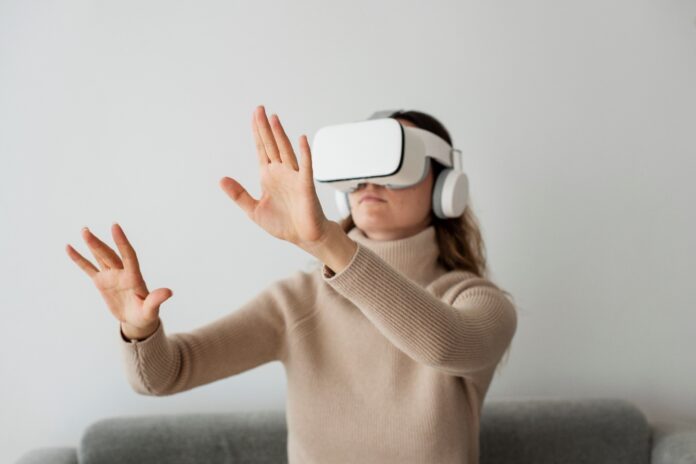The global Pandemic has nudged enterprises to speed up technology adoption, especially those motivated by the urge to find an alternative for travel. Except for video interaction, there aren’t many efficient solutions developed in this domain. However, a great deal of work is going on with the cooperation of innovations such as Augmented Reality (AR) and Virtual Reality (VR), which would make it feasible to create a more immersive virtual travel experience in the Metaverse. As a result, it’s increasingly giving hope to travel just about anywhere in the world. You should just be aware about the metaverse and its functionality in the travel sector to be more involved in the process.
Big online firms, including Microsoft, Disney, Amazon, and Meta are already constructing their own variants of the Metaverse. And smaller organizations such as Equinox and Delta Reality are interested in partnering with tourism bureaus to develop engaging, and even game-like augmented, virtual and mixed reality material that accentuates various destinations to visit.
Virtual tourism may operate as a jump-off point to face-to-face tourism. For example, in early 2022, Madrid provided a free 360º virtual view in Spanish and English. It is meant for potential guests to make educated selections on what to see when exploring Madrid. With roughly 40 of the capital’s most famous attractions, users may tour the city’s squares, museums, parks, cultural institutions and churches.
One additional and vital destination has also made moves in that manner. In September 2021, The first of the major cities to declare ambitions to go “meta” by 2023 was Seoul. Its metaverse platform, provisionally branded “Metaverse Seoul,” will showcase some of the city’s main tourism sites. Tourists will be able to feel as if they’re wandering through Deoksugung Palace and Gwanghwamun Plaza in what would be termed a Virtual Tourism Zone without the hassles of in-person travel. They also might “attend” Seoul’s greatest festivities in the Metaverse, like the magnificent Seoul Lantern Festival, filled with hundreds of bright lights but not by people.
No one loves the chaos while on vacation. Users that desire a virtual vacation experience anticipate the same. In brief, technology has to ensure smooth synchronization of user activities and sight so that virtual Egypt and Australia trips seem as near to reality as possible. Reducing latency is highly critical when providing this degree of extrasensory material. This also goes for hotels and resorts competing for tourists’ interests and attempting to improve their stay with customized packages and seamless experiences. One method is to give consumers 3D AR tours of hotels, resorts, or other destinations.
Yet, there’s no alternative for the human senses — it integrates all the senses that allow us to experience varied locations. But if just one or two of those senses are used, how can you argue that you’re experiencing a place? For example, how can you substitute the feeling of drops from a waterfall cascading on your skin, the surge of wind in your face, the scent of the ground after the rains, or the heat of the sun stroking your face on a cold morning?
Similarly, there is no alternative for human interaction — chatting to bots cannot offer you the experience of meeting someone for the first time, forming a relationship, having a laugh together, or appreciating each other’s company.
We know virtual travel in the Metaverse cannot fully replace physical travel. However, it will complement the experience hugely, and over time, it will be an integral element of the travel ecology. It might even revolutionize how passengers interact in pre, post & in-trip experiences.
While it is essential to comprehend how Metaverse travel & tourism are contributing to modernizing the industry, corporate masters, as well as other decision-makers, should also be aware of the genuine benefits. Here are some of the aspects which might have a substantial benefit from virtual tourism:
- Improve the Booking Experience
Aside from generating motivation, metaverse travel & leisure solutions may greatly increase booking operations by supplying pertinent data that cannot be accurately presented in other methods.
Read More: – How should a website be designed? Tips for web design
For example, hotels may employ VR tours or digital avatars to allow consumers to walk around a realistic replica of their property, gaining a feel of how big rooms are and what services are available. Meanwhile, visit agencies may employ VR tours to present consumers with life-like experiences of a region they desire to travel to.
- Inspire Tourism-Related Purchases
A key plus feature linked with the notion of metaverse tourism is the way it may aid in inspiring travelers. For example, interactive virtual reality experiences may reproduce real-world situations and give passengers a good idea of what they could anticipate when visiting a certain area.
A similar strategy may be expanded to hotels and travel, with VR experiences helping prospective consumers understand what resorts offer or how long a trip would take. Ultimately, this implies the Metaverse may aid to excite travelers and urge them to make a booking or purchase.
- Increase Booking Volume
Ultimately, the actual benefit of metaverse tourist products throughout a booking process is their capacity to raise total booking volumes. This happens owing to a blend of the previous two factors.
Furthermore, the process of reserving hotels, flights, restaurant tables and other similar services becomes significantly more interesting, informative, and effective as a tool for influencing buying choices.
The Bottom Line
These are among the most successful techniques for the metaverse tourist industry that could alter the travel market. Interactive virtual worlds might revolutionize how customers connect with different locales and replace some instances of real travel without damaging the business. So if you’re seeking someplace fresh to explore on your upcoming trip, why not try out the Metaverse?

















